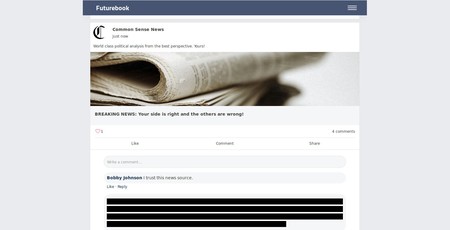ORG's Futurebook site showcases post-Brexit digital rights risks
July 3, 2019 | 10:31
Companies: #open-rights-group #uk-government

Pro-privacy campaign organisation the Open Rights Group has launched a project dubbed Futurebook, designed to sound alarm bells over how the web could look in a post-Brexit UK where the government has opted to rescind citizens' digital rights.
The UK's departure from the European Union, long delayed following an advisory referendum fraught with verified yet never-punished illegalities but currently scheduled to take place on October 31st, would bring with it the government's ability to roll back consumer and digital rights legislation put in place for adherence with wider EU laws. While it's by no means guaranteed that the government, which has already lost two sitting Prime Ministers over its handling of the so-called 'Brexit' process and whose current frontrunners for the position appear unlikely to offer much improvement, would choose to do so, the Open Rights Group has launched a project which aims to showcase the risk: Futurebook.
A live demonstration of how social networking could operate in a post-Brexit UK, Futurebook, based largely on the popular Facebook platform, has extremely invasive advertising - simulated, thankfully - and content which is blocked for UK visitors, along with an inability to leave any comments and bandwidth throttling on its streaming media. All these, the organisation claims, are potential outcomes should EU-based digital policy acts adopted by the UK be rescinded following its departure from the Union.
'If we lose rights to free expression and privacy, the online world will begin to look a lot more like Futurebook - creepy, annoying and bland,' claims Matthew Rice, director for Open Rights Group Scotland, of the project. 'Futurebook is a nightmare that Open Rights Group is determined to fight against.'
The restrictions on Futurebook's users are based in no small part on the Open Rights Group's earlier reports into post-Brexit privacy and freedom of expression. A particular inspiration is taken from the E-Commerce Directive 2000, which prevents EU Member States from imposing liability on social media platforms like Facebook and Twitter for content created by its users - the resciding of which would lead to Futurebook's liability-reducing comment ban. Other laws showcased by Futurebook include the EU Open Internet Regulation 2015, which concerns itself with the concept of net neutraility, and the EU General Data Protection Regulation (GDPR) and Electronic Communications Regulation.
Futurebook is available to browse - though little else - now at www.futurebook.co.

MSI MPG Velox 100R Chassis Review
October 14 2021 | 15:04








Want to comment? Please log in.